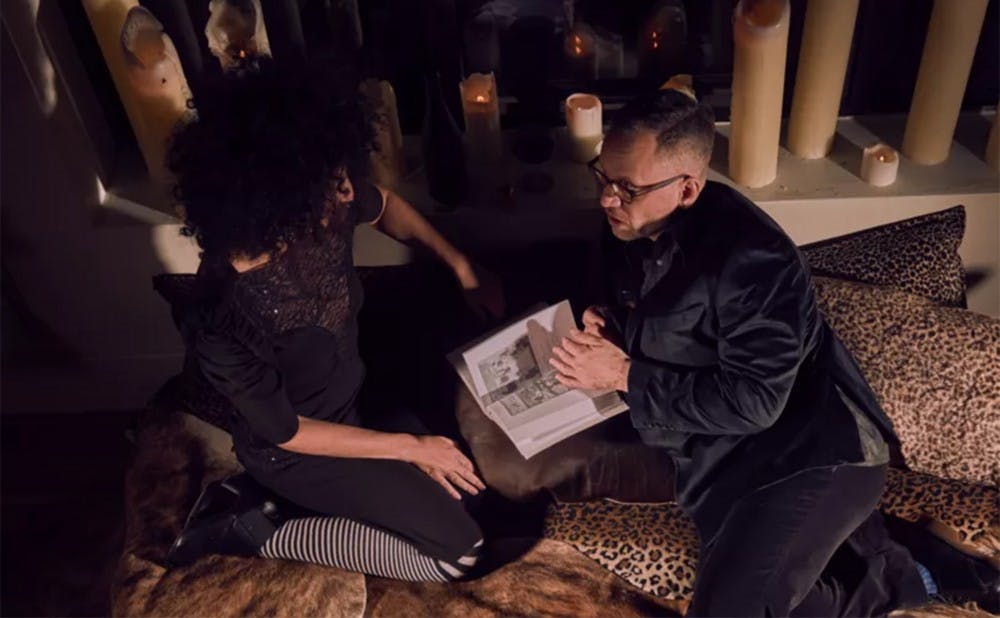In their latest play “The Undertaking,” The Civilians, a New York-based theater company, is here to remind you that you are all going to die.
Written and directed by Steve Cosson, “The Undertaking” has a simple premise: Steve (Dan Domingues) is an interviewer, and he spends an evening with his friend Lydia (Irene Lucio) discussing interviews he did concerning death. Using a technique known as investigative theater, the play draws from real-life interviews and performs them almost word for word. A mix of dramatic duologue and interview snippets (the interviewees are also portrayed by Lucio and Domingues), the play revisits mankind’s oldest subject of fascination and makes it urgent and terrifying—more so than it already is.
“The initial impetus was to try to grapple with a subject that is universal, but is also in many ways marginalized in our culture,” Cosson said.
Early in the play, Lydia playfully notes how nothing in Whole Foods ever rots, and how in cities, dead bodies are efficiently moved out of sight and out of mind.
Death in “The Undertaking,” in contrast, is funny and heartbreaking and all sorts of weird. An interviewee tells us with a straight face that, when you die, they put a plastic screw in your ass to keep the gasses in. Also featured in the play: fluids, explosions, seppuku and Alzheimer's. If the in-your-face depictions of death make you uncomfortable, then Cosson and the actors have succeeded. To them, approaching death with equanimity is a lie.
As Hamlet taught us, the thing to do when confronting mortality is to run your mouth. Driven by two chatty New Yorkers, “The Undertaking” is a literate play that is quick on its feet, one moment analyzing the Tibetan Book of the Dead, and talking about Derrida and ayahuasca the next. Whether this comes across as erudite or show-offish depends much on the audience. After making a trite observation, Lydia says: “it’s the most unoriginal idea I’ve ever had in my life… but it’s different when you feel it, you know?” The play never reaches the level of being consistently profound, but there are more hits than misses.
Yet the dramatic heart of “The Undertaking” is not the clever banter. Midway through the play, Lydia convinces a reluctant (but sufficiently drunk) Steve to go with her into the underworld so as to “know death.” With the help of Jean Cocteau’s “Orpheus” (1950), which is projected onto the shimmering stage backdrop, the protagonists go on a peculiar and hypnotic journey.
Domingues described going into the underworld as a “flight of fancy” but also a “hyperreality,” and for the audience watching, it definitely resembles an altered state of consciousness. There is a ritualistic quality to the project, which, complemented by thoughtful choices in sound and light, recalls a more chaotic, primal time. In direct reference to ancient rituals of the living going into the world of the dead, Steve and Lydia “spontaneously make up their own ritual” in order to relive that tradition, Cosson said. In this sense, theater is not just helpful but also intrinsically tied to the exploration of death.
“[The ritual] is a type of armor, which is simultaneously a game that makes it fun and safe, but also theatricalizes a lot of what you have to do in order to go down into your own fears,” Lucio said. “They’re trying to make a piece of theater of facing these things.”
On the bright side, at least you won’t have to die alone. One of the play’s highlights is the discussion of the longstanding archetype of psychopomps, Greek for guide to the underworld—similar to how you get an RA when first arriving in college, the psychopomp is the "death RA” according to Lucio. This awareness of somebody on the other side, which may be near-death delirium but may also be real, is striking because it shows how reality blurs when one approaches the fine line dividing life and death. Life blurs into theater and vice versa.
Speaking from his personal experience, Domingues alluded to the mysterious push and pull when people arrive at this boundary.
“My grandmother was in a coma for six days before she died. She was in my aunt's house, and of course the family just descended, it was a huge family. The nurse said that she was very close to death, and she was holding on because everyone was still there, and usually what she saw was people die when family members left the room.”
Just as Domingues’s story is included here verbatim, “The Undertaking” includes interview moments which are similarly raw. And so the play is exhausting; brilliant and deeply affecting, yes, but one does not come away from near-death experiences unscathed. Consolation may be found in the words of Lydia, who comforts Steve when he is stricken by memories of death:
“It is not your death. And also, it’s not happening right now.”
“The Undertaking” was performed at Shaefer Theater from Sept. 29 to Oct. 1. The Civilians will return Jan. 2017 to continue their two-part residency at Duke.
The residency, arranged by Duke Performances in cooperation with the Theater Studies department and the Center for Documentary Studies, will include class visits and potentially involve student collaborations in the future.
Get The Chronicle straight to your inbox
Sign up for our weekly newsletter. Cancel at any time.

